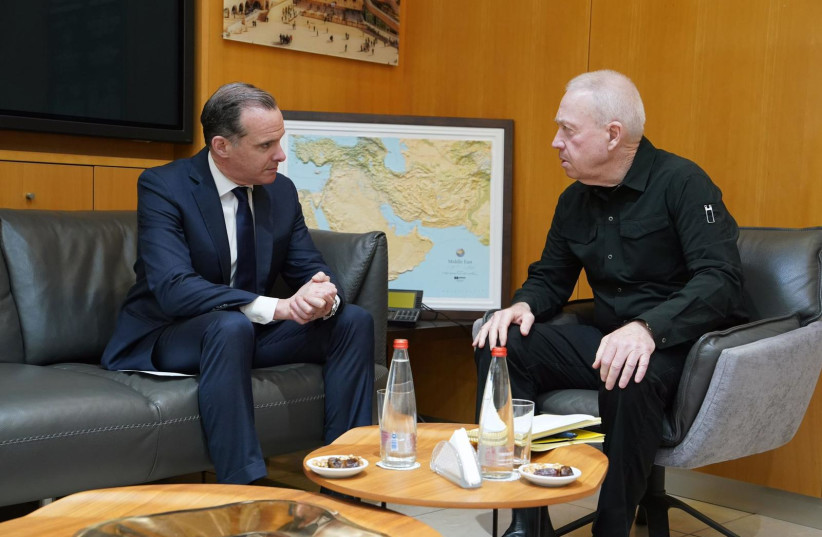The war cabinet agreed to send a high-level delegation to a second Paris summit on hostage talks in hopes of a breakthrough that would allow a deal to be reached before the month-long Ramadan holiday, which begins on March 10.
“We are confident that the Israeli delegation... will promote a quick deal to return all the hostages, those who are alive and those who have been murdered,” the Hostages and Missing Families Forum said as it welcomed the decision.
The summit this weekend, likely to be on Friday, is expected to be held by CIA Director William Burns, who led the last such meeting at the end of January. It follows talks he held in Cairo.
Mossad chief David Barnea, Shin Bet (Israel Security Agency) chief Ronen Bar, Maj.-Gen. (res.) Nitzan Alon, Qatari Prime Minister Mohammed Al Thani, and the head of the Egyptian Intelligence Services Abbas Kamel are all expected to attend. Qatar and Egypt have been mediating a deal.
The war cabinet’s decision came as US Middle East envoy Brett McGurk was in Israel, where he met with that military forum as well as individually with Prime Minister Benjamin Netanyahu, Defense Minister Yoav Gallant, and relatives of the six hostages with dual Israeli citizenship. McGurk arrived in Israel after a stop in Cairo.

In a sign of the political division over the best way to secure the release of the hostages, Finance Minister Bezalel Smotrich (Religious Zionist Party) attacked the decision, warning that attempts to negotiate a deal had delayed the release of the remaining 134 captives in Gaza.
“I am convinced that if all the heads of state and the security establishment had... refused to negotiate and had only spoken with fire and brimstone, the absolute majority of the hostages would have been home safe and sound a long time ago,” Smotrich said.
Israeli officials have preferred a deal, akin to the one in November that saw the release of 105 of the captives in exchange for a week-long pause in the war. It’s expected that a second deal would involve a second pause in the war and a release of Palestinian terrorists and security prisoners held in Israeli jails, including those with “blood on their hands.”
Israel and Hamas have been at odds over the terms of a deal with Hamas insisting on a full IDF withdrawal and an end to the war, while Israel has insisted that it must be allowed to finish its military campaign to destroy Hamas.
Recent developments in hostage deal talks seem 'positive' from all sides
But in the last few days, there has been a sense that Hamas might be more willing to make a deal. France’s announcement on Wednesday that it had received confirmation that medications had reached 45 of the hostages, was seen as a positive signal.
White House National Security Communications Adviser John Kirby that initial reports from McGurk had indicated that discussions were “going well.”
Gallant optimistically told McGurk when they met in Tel Aviv that he believed Israel would “widen the mandate for the officials involved in the negotiations on the hostages.” He also underscored however that the IDF “will continue to expand its ground operation in Gaza.”
The two discussed the imminent Rafah operation
They also spoke about the importance of an Israeli plan to ensure the safety of Palestinian civilians should the IDF embark on a military operation in Rafah.
The pending Rafah operation, which has been widely condemned by the international community even before it has been executed, has been one of the pressure levers Israel has used to push Hamas to soften its stance on the terms of a deal.
The two men also discussed “operational developments in Hamas strongholds in central and southern Gaza, and humanitarian aid efforts facilitated by Israel, together with US leadership and international partners.”
Gallant stressed “the importance of dismantling remaining Hamas battalions in central and southern Gaza,” his office stated.
In New York, US Ambassador to the UN, Robert Wood spoke with the United Nations Security Council about the importance of a pause to the war, rather than a cease-fire, as he also took an optimistic view of the proceedings.
“The pace of hostage talks can be frustrating. They are complicated by practical considerations – and as we all know, negotiations at such high stakes do not always yield immediate results.
“For this reason, we are working day in and day out – with our partners in Egypt and Qatar – to achieve a positive result that would bring the hostages home and result in a six-week-long cessation in fighting,” Wood said.
He also cautioned Israel about a Rafah operation. US President Joe Biden and US Secretary of State Antony Blinken “made clear to Israel that under current circumstances a major ground offensive into Rafah would result in civilian harm and displacement, including potentially into neighboring countries, which would have serious implications for regional peace and security.
“As such, we have underscored that such a major ground offensive should not proceed under current circumstances."
“We all want to see a durable end to this conflict, and there are three key elements I’d like to highlight.
A temporary ceasefire conditioned on an agreement to release the hostages is the first step. Again, this is the best path forward,” Wood said.
Maariv contributed to this report.
